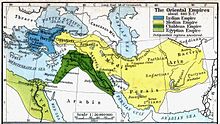- Mazares
-
Mazares (Ancient Greek: Μαζάρης) was a Median general who defected to Cyrus the Great when the latter overthrew his grandfather, Astyages and formed the Persian Empire.
Mazares in Herodotus' Histories
Mazares is mentioned in Herodotus as a Median general in the service of Cyrus the Great who died while putting down a revolt in Asia Minor.
After Cyrus' conquest of Lydia in 539 BC, a Lydian official named Pactyas, whom Cyrus had honored by making him a treasury official in his own government, raised an army of Lydians and Ionian Greeks. He revolted against Tabalus, Cyrus' Satrap at Sardis in Lydia, besieging the Persian forces in the royal enclosure and stealing from the famed Lydian Horde [the riches of King Crœsus] to finance his revolt.
Cyrus, upon hearing of the revolt, was enraged and made plans to punish the Lydians by burning Sardis to the ground. King Crœsus, whom had been made an advisor to Cyrus' court after his defeat, entreatied Cyrus to leave his former king seat unharmed.
According to Herodotus, Crœsus' recommendation was to disarm the population and enact trade laws that would turn the minds of the people to habits of luxury and pleasure.
"By doing this," Crœsus advised, "the people will, in a short time, become so enervated and so effeminate that you will have nothing to fear from them."
Cyrus, who was to become known for the mercy he showed to the peoples he conquered, agreed and sent his commander, Mazares to put down the insurrection according to Crœsus' wishes, with instructions to return Pactyas alive for punishment. But Pactyas fled when Marzares' forces approached the city and found refuge in Ionian Greece.
Mazares gave chase, conquering the Ionian Greek city-states of Priene and Magnesia, capturing Pactyas after several attempts, sending him back to Cyrus for punishment. Mazares then continued the conquest of Asia Minor, but died of unknown causes while on campaign.
Cyrus then sent his leading general, Harpagus, to take his place. Harpagus completed Mazares' conquests of Asia Minor, Lycia, Cilicia and Phoenicia, using the hitherto unknown technique of building earthworks to breach the walls of besieged cities.
External links
Median topics Language Median language, Iranian languageCities Battles involving Lydia Battles involving Persia Persian Revolt • Battle of Hyrba • Battle of the Persian Border • Siege of Pasargadae Hill • Battle of Pasargadae • Fall of EcbatanaKings/Satraps Other Medians Categories:- Generals
- Median people
- Achaemenid military leaders
- 6th-century BC deaths
- Characters in Herodotus
Wikimedia Foundation. 2010.

